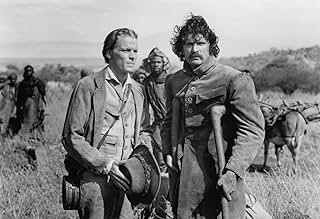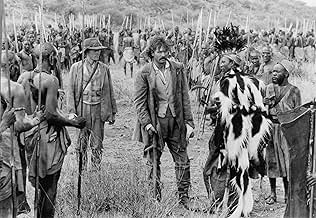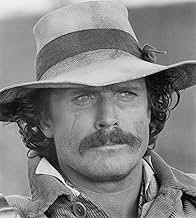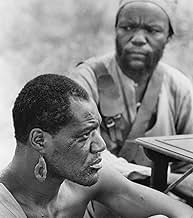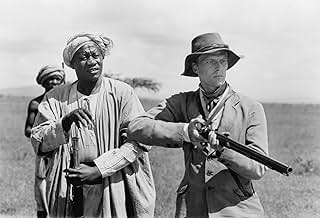ÉVALUATION IMDb
7,1/10
4,6 k
MA NOTE
Ajouter une intrigue dans votre langueThe legendary true-story of Capt. Richard Francis Burton and Lt. John Hanning Speke's tumultuous expedition to find the source of the Nile river.The legendary true-story of Capt. Richard Francis Burton and Lt. John Hanning Speke's tumultuous expedition to find the source of the Nile river.The legendary true-story of Capt. Richard Francis Burton and Lt. John Hanning Speke's tumultuous expedition to find the source of the Nile river.
- Prix
- 1 victoire au total
Avis en vedette
I have to admit that, before it was shown on television a few weeks ago, I had never heard of the movie. When I see how many people wrote a review or voted for this movie on IMDb, I guess I'm not the only one. It's clear to me that this is a movie that has never had any attention. Not from the public, the cinema's nor the festivals. Even journalist didn't pay much attention to it. Does that mean this movie isn't worth seeing? Certainly not, although the subject probably isn't very attractive to the mainstream audience.
The movie tells the story of Burton and Speke, two friends and explorers who tried to find the source of the Nile in the middle of the nineteenth century. Burton was more of an anthropologist who wanted to learn more about the indigenous tribes which they encountered on their journeys, while Speke was more interested in the discovery of the source itself. Once they were back home they become enemies, because Speke tells everybody who wants to hear it that he alone discovered the source of the Nile, namely Lake Victoria.
There are different things that I liked about this movie. The acting was very good, the costumes were nice, but what I really liked were the images from the African landscapes, the animals, the people... Seeing the images from England just made me look forward to the next scenes in Africa. It never felt right to see these two explorers in England, you're always left with the feeling that they belong in Africa. I guess that is where the strength of this movie lies ... It makes you feel exactly the way these men felt. I reward this little masterpiece with an 8/10.
The movie tells the story of Burton and Speke, two friends and explorers who tried to find the source of the Nile in the middle of the nineteenth century. Burton was more of an anthropologist who wanted to learn more about the indigenous tribes which they encountered on their journeys, while Speke was more interested in the discovery of the source itself. Once they were back home they become enemies, because Speke tells everybody who wants to hear it that he alone discovered the source of the Nile, namely Lake Victoria.
There are different things that I liked about this movie. The acting was very good, the costumes were nice, but what I really liked were the images from the African landscapes, the animals, the people... Seeing the images from England just made me look forward to the next scenes in Africa. It never felt right to see these two explorers in England, you're always left with the feeling that they belong in Africa. I guess that is where the strength of this movie lies ... It makes you feel exactly the way these men felt. I reward this little masterpiece with an 8/10.
A great story, beautifully filmed and acted about two Victorian era explorers. Irish-born Sir Richard Francis Burton, one of the greatest explorers in history, is in search of knowledge. English-born dilletante John Hanning Speke joins Burton's quest in search of glory. Together they search for the answer to one of the most elusive geographical questions of their time - what is the Nile's source? The film accurately shows how the Royal Geographical Society and other outside interests played Burton and Speke against each other for their own gain.
The film's tagline really says it all: "Two strangers made friends by a savage world. Two friends made enemies by a civilized world."
The film's tagline really says it all: "Two strangers made friends by a savage world. Two friends made enemies by a civilized world."
The British Empire owed a lot to opportunistic soldiers of fortune as well as to explorers: men who risked their lives (and the lives of others) for profit, fame and the recognition from their peers for their accomplishments. In the last category one could think of men like Livingstone, Stanley, Scott and Burton. Captain Richard Francis Burton (whose life we follow in this film) risked a lot for the sake of discovery (to find the source of the Nile) but at the same time he was also a man with a genuine interest and outmost respect for the indigenous peoples and cultures found deep in Africa.
In the film we see Burton joining forces with a young and ambitious Lieutenant (Lt. Speke) to travel again to his beloved Africa to locate the source of Nile with an expedition funded by the Royal Geographical Society. The film is an account of this trip but shows also events before and after this. Watching this movie we can grasp the differences between the two men, their strong ties and friendship during their common effort in the expedition and also later how each one coped with their success at home (London).
The Mountains of the Moon is a fascinating film. It tells a great story without romanticizing the situations during and after the trip to Africa. Burton, Speke and their comrades endured too much to find the source of Nile, and all of them for their own reasons. The novel by William Harrison (that this movie is based on) does not fall into the trap of trying to imitate Conrad's 'Heart of Darkness' but gives us a different perspective altogether. Do not miss this film.
In the film we see Burton joining forces with a young and ambitious Lieutenant (Lt. Speke) to travel again to his beloved Africa to locate the source of Nile with an expedition funded by the Royal Geographical Society. The film is an account of this trip but shows also events before and after this. Watching this movie we can grasp the differences between the two men, their strong ties and friendship during their common effort in the expedition and also later how each one coped with their success at home (London).
The Mountains of the Moon is a fascinating film. It tells a great story without romanticizing the situations during and after the trip to Africa. Burton, Speke and their comrades endured too much to find the source of Nile, and all of them for their own reasons. The novel by William Harrison (that this movie is based on) does not fall into the trap of trying to imitate Conrad's 'Heart of Darkness' but gives us a different perspective altogether. Do not miss this film.
In the Nineteenth Century, the British writer, geographer and explorer Captain Richard Francis Burton (Patrick Bergin) meets the Lieutenant John Hanning Speke (Iain Glen) during a dangerous journey in Africa and after being saved by Speke, they become friends. Soon they team-up to seek the source of the Nile River sponsored by the Royal Geographic Society. Meanwhile Burton meets his fan Isabel Arundell (Fiona Shaw) and they get married to each other. Burton and Speke travel for many months through Africa where they face brutal tribes, diseases, hunger and many other dangers together. Speke finds a lake that he believes it is the source of Nile River but Burton disagrees and believes they need more scientific research to be sure. When they separately return to London, the ambitious publisher Larry Oliphant (Richard E. Grant) stirs up a quarrel between the two friends and Speke travels alone to Africa trying to prove his findings. Will their friendship end?
"Mountains of the Moon" is a fascinating adventure with a story of friendship based on a historic event, the journey of Captain Richard Francis Burton and Lieutenant John Hanning Speke to the African Great Lakes. The plot may be not accurate but the film is engaging and the landscapes are breathtaking. The viewer does not feel the 136 minutes running time. My vote is eight.
Title (Brazil): "Montanhas da Lua" ("Mountains of the Moon")
"Mountains of the Moon" is a fascinating adventure with a story of friendship based on a historic event, the journey of Captain Richard Francis Burton and Lieutenant John Hanning Speke to the African Great Lakes. The plot may be not accurate but the film is engaging and the landscapes are breathtaking. The viewer does not feel the 136 minutes running time. My vote is eight.
Title (Brazil): "Montanhas da Lua" ("Mountains of the Moon")
It's 1854. Entitled aristocratic John Hanning Speke (Iain Glen) arrives on the East African Coast on leave from the Army. He recruits Captain Richard Francis Burton (Patrick Bergin) on a journey to find the source of the Nile. Burton is an expert on natives. They call the location Mountains of the Moon. The expedition is soon attacked by a local tribe. Burton and Speke barely escape. Back in England, Burton is organizing a new expedition with the Royal Geographical Society. Isabel Arundell is a well-read spinster and completely taken with Burton. With Speke at his side, Burton returns to Africa to lead a grand expedition following Arab slave trade routes into the interior. They rescue escaped slave Mabruki (Delroy Lindo) from the lions.
It is an epic Victorian adventure. It's too bad that few saw it and it continues that few people knows about it. It is grand and a character study. The black Africans are not cartoon characters. One can compare it to Lawrence of Arabia. The cinematography is not quite as great but the story is every bit as compelling. This is an old fashion epic that is being made less and less. There is so much in this story. Surprisingly, the last half hour takes place in England. Changing tone from tense adventure in Africa to Academic back-fighting in London can be tough but the movie never stops being interesting.
It is an epic Victorian adventure. It's too bad that few saw it and it continues that few people knows about it. It is grand and a character study. The black Africans are not cartoon characters. One can compare it to Lawrence of Arabia. The cinematography is not quite as great but the story is every bit as compelling. This is an old fashion epic that is being made less and less. There is so much in this story. Surprisingly, the last half hour takes place in England. Changing tone from tense adventure in Africa to Academic back-fighting in London can be tough but the movie never stops being interesting.
Le saviez-vous
- AnecdotesThe spear through Burton's face was an actual event, although the scar as depicted was wrong. The spear split his palate, causing a serious internal fracture of the jaw. It also came close to severing his tongue and it knocked out a half-dozen teeth, as well. The fact that he could survive such an extreme injury was near miraculous.
- GaffesIn an scene set in 1854, Isabel is looking at a copy of "The Perfumed Garden" translated by Burton. Burton did not publish this translation until 1886. While Burton's translation was published in 1886, the original was written between 1410 and 1434. (Burton's unexpurgated translation, to be called "The Scented Garden", was still only in manuscript form when he died. Isabel burned it, believing that would help save his soul from damnation.)
- Citations
Arab chief in Cairo: In this wilderness you will find only Allah's terrible whimsy.
- Générique farfeluThis motion picture's opening title card reads: "East African Coast 1854".
Meilleurs choix
Connectez-vous pour évaluer et surveiller les recommandations personnalisées
- How long is Mountains of the Moon?Propulsé par Alexa
Détails
Box-office
- Budget
- 19 000 000 $ US (estimation)
- Brut – États-Unis et Canada
- 4 011 793 $ US
- Fin de semaine d'ouverture – États-Unis et Canada
- 66 683 $ US
- 25 févr. 1990
- Brut – à l'échelle mondiale
- 4 011 793 $ US
- Durée
- 2h 16m(136 min)
- Couleur
- Rapport de forme
- 1.85 : 1
Contribuer à cette page
Suggérer une modification ou ajouter du contenu manquant




